
The Supreme Court appears poised to narrow the scope of law requiring research on “environmental impacts” before starting large development projects, a more than 50-year-old requirement under the National Environmental Policy Act (NEPA) that critics say has led to delays and increased costs for large-scale energy projects.
During arguments on Tuesday, the justices considered a case involving an 88-mile rail line in Utah designed to transport crude oil to Gulf Coast refineries. Environmentalists and local governments have argued that regulators failed to assess the broader environmental consequences of the project, including Gulf Coast air pollution and risks of rail accidents along the route.

The U.S. Court of Appeals for the D.C. Circuit previously sided with these challengers, requiring the Surface Transportation Board (STB) to evaluate the project’s “upstream and downstream” effects on the environment. However, the justices signaled skepticism toward such an expansive interpretation.
“Throughout the argument, a majority of the Court seemed to signal that the D.C. Circuit under review had required the federal government to consider environmental impacts too far afield from the railroad project that was under review,” University of Minnesota Law School professor James Coleman told the Washington Examiner.
Paul Clement, a veteran litigant with a high record of success at the high court, represented seven Utah counties supporting the rail line, urging the justices to limit NEPA reviews to only “direct impacts” of projects under an agency’s jurisdiction. He argued that the current standard requiring analysis of effects “remote in time and space” creates unnecessary delays that discourage investment. “For investors, time is money,” Clement noted.
Environmental advocates, including the Center for Biological Diversity, have said that NEPA’s broad scope is vital to protecting ecosystems and communities. “Communities in the Uinta Basin and the Gulf Coast will suffer the most from this oil railroad,” said Wendy Park, an attorney for the center. She warned that scaling back NEPA reviews would prioritize industry profits over public health.
But most if not all of the justices appeared hesitant to uphold the status quo for NEPA and appeared open to embracing a new and narrower set of standards under the law, though how exactly they would rule remains to be seen.
Justice Amy Coney Barrett suggested the eventual decision could clarify existing guidelines without establishing a sweeping precedent, asking whether they might simply “put more flesh on the bone.”
Similarly, Justice Elena Kagan questioned the practicality of assessing the environmental effects that an agency cannot regulate. “If the STB can’t do anything about refineries, one wonders what all this fuss and bother is about,” she remarked.
“Several justices, including Kagan, Sotomayor, Jackson, and Coney-Barrett, questioned whether this test was too narrow given the purposes of NEPA and too hard to implement,” Michael Drysdale of Dorsey & Whitney told the Washington Examiner after oral arguments.
Coleman said the justices appeared focused on finding a way to write a “decision that would establish general rules describing the kinds of effects that are too remote for agencies to require consideration of them.”
CLICK HERE TO READ MORE FROM THE WASHINGTON EXAMINER
A ruling in favor of Utah’s counties could significantly limit the reach of environmental reviews, a prospect welcomed by developers, energy companies, and incoming President-elect Donald Trump, who has expressed similar complaints about the time and money spent prioritizing environmental studies over actually completing developments like the one at issue in this case.
Justice Neil Gorsuch, who recused himself due to a potential conflict of interest, did not participate.







